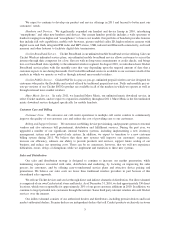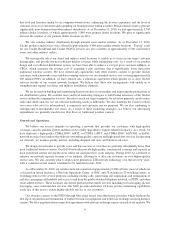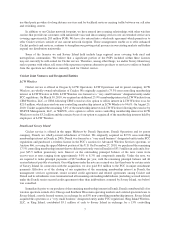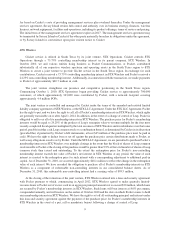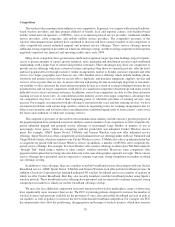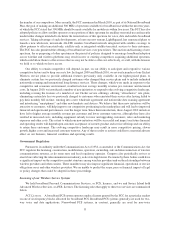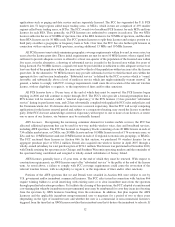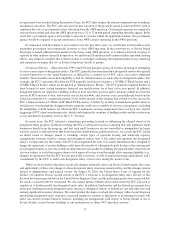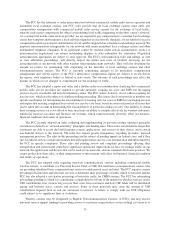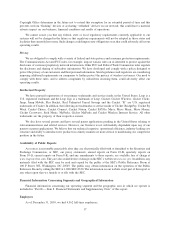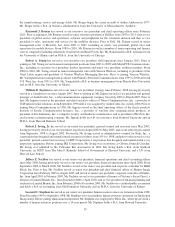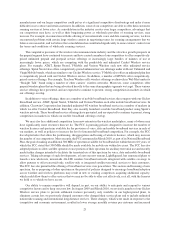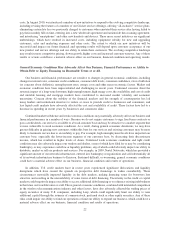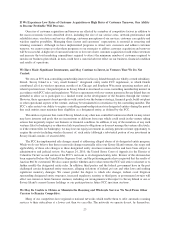Cricket Wireless 2010 Annual Report Download - page 21
Download and view the complete annual report
Please find page 21 of the 2010 Cricket Wireless annual report below. You can navigate through the pages in the report by either clicking on the pages listed below, or by using the keyword search tool below to find specific information within the annual report.The FCC has the authority to order interconnection between commercial mobile radio service operators and
incumbent local exchange carriers, and FCC rules provide that all local exchange carriers must enter into
compensation arrangements with commercial mobile radio service carriers for the exchange of local traffic,
whereby each carrier compensates the other for terminating local traffic originating on the other carrier’s network.
As a commercial mobile radio services provider, we are required to pay compensation to a wireline local exchange
carrier that transports and terminates a local call that originated on our network. Similarly, we are entitled to receive
compensation when we transport and terminate a local call that originated on a wireline local exchange network. We
negotiate interconnection arrangements for our network with major incumbent local exchange carriers and other
independent telephone companies. If an agreement cannot be reached, under certain circumstances, parties to
interconnection negotiations can submit outstanding disputes to state authorities for arbitration. Negotiated
interconnection agreements are subject to state approval. The FCC’s interconnection rules and rulings, as well
as state arbitration proceedings, will directly impact the nature and costs of facilities necessary for the
interconnection of our network with other wireless telecommunications networks. They will also determine the
amount we receive for terminating calls originating on the networks of local exchange carriers and other
telecommunications carriers. The FCC is currently considering changes to its intercarrier compensation
arrangements and various aspects of the FCC’s intercarrier compensation regime are subject to review before
the agency, state regulatory bodies or federal or state courts. The outcome of such proceedings may affect the
manner in which we are charged or compensated for the exchange of traffic.
The FCC has adopted a report and order and a further order on reconsideration clarifying that commercial
mobile radio service providers are required to provide automatic roaming for voice and SMS text messaging
services on just, reasonable and non-discriminatory terms. The FCC orders, however, do not address roaming for
data services, which are the subject of a further pending proceeding. The orders also do not provide or mandate any
specific mechanism for determining the reasonableness of roaming rates for voice or SMS text messaging services
and require that roaming complaints be resolved on a case-by-case basis, based on a non-exclusive list of factors that
can be taken into account in determining the reasonableness of particular conduct or rates. Our inability to obtain
these roaming services on a cost-effective basis may limit our ability to compete effectively for wireless customers,
which may increase our churn and decrease our revenues, which could materially adversely affect our business,
financial condition and results of operations.
The FCC recently adopted an order codifying and supplementing its previous internet openness principles
(sometimes referred to as “network neutrality” principles) into binding rules. These rules are intended to ensure that
consumers are able to access the lawful internet content, applications, and services of their choice, and to attach
non-harmful devices to the network. The rules also require greater transparency regarding providers’ network
management practices. The rules in this proceeding are the subject of pending appeals in federal court, and if they
survive judicial review, contain uncertainties that will require future case-by-case interpretation and enforcement by
the FCC in specific complaints. These rules and pending review and complaint proceedings affecting their
interpretation and enforcement could have significant operational implications for how we manage traffic on our
network, the applications and devices that can be used on our networks, and our consumer disclosure practices. We
cannot predict how these rules, or their interpretation or enforcement, will affect our business, financial condition
and results of operations.
The FCC has adopted rules requiring interstate communications carriers, including commercial mobile
wireless carriers, to contribute to a Universal Service Fund, or USF, that reimburses communications carriers who
are providing subsidized basic communications services to underserved areas and users. The FCC requires carriers
providing both intrastate and interstate services to determine their percentage of traffic which is interstate and the
FCC has also adopted a safe-harbor percentage of interstate traffic for CMRS carriers. The FCC has rulemaking
proceedings pending in which it is considering a comprehensive reform of the manner in which it assesses carrier
USF contributions, how carriers may recover their costs from customers and how USF funds will be distributed
among and between states, carriers and services. Some of these proposals may cause the amount of USF
contributions required from us and our customers to increase. A failure to comply with our USF obligations
could subject us to significant fines or forfeitures.
Wireless carriers may be designated as Eligible Telecommunications Carriers, or ETCs, and may receive
universal service support funding for providing service to customers using wireless service in high cost areas or to
15


